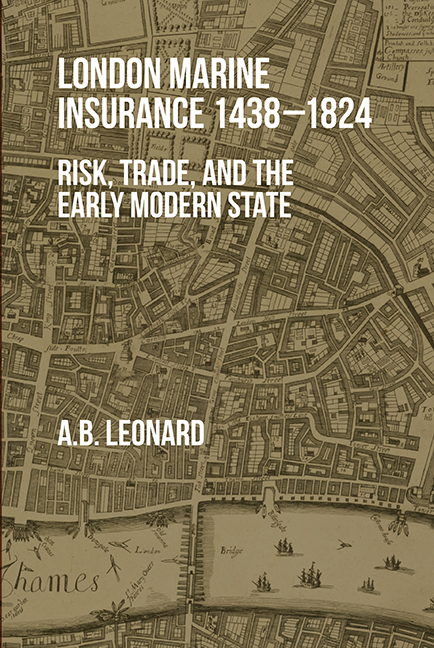Book contents
- Frontmatter
- Contents
- List of Illustrations
- Preface
- Glossary of marine insurance terms
- Introduction
- 1 The merchant-insurers’ system: London marine insurance to the 1570s
- 2 1570–1688: Buyers and the first intervention
- 3 1688–1720: The sellers’ intervention
- 4 To 1824: Lloyd’s and the common law
- 5 Conclusions
- Appendix: Some London underwriters active 1690–1717
- Bibliography
- Index
- Frontmatter
- Contents
- List of Illustrations
- Preface
- Glossary of marine insurance terms
- Introduction
- 1 The merchant-insurers’ system: London marine insurance to the 1570s
- 2 1570–1688: Buyers and the first intervention
- 3 1688–1720: The sellers’ intervention
- 4 To 1824: Lloyd’s and the common law
- 5 Conclusions
- Appendix: Some London underwriters active 1690–1717
- Bibliography
- Index
Summary
Ocean-going trade in the early modern period was fundamentally precarious, unpredictable, and fraught with peril. Merchants often had no choice but to bear the dangers – to ‘run the risk’ – of naked threats which, at worst, could mean the complete destruction of a season's invested capital, spelling ruin for an individual merchant-adventurer. The rage of the oceans often caused the total loss of ships and their cargoes, or inflicted extensive damage before goods reached markets. The violence of men, in the form of warships, pirates and privateers, raiders, thieves, and brigands, was sometimes an even greater danger. Especially in wartime, human risks to trade were recurrent and grave. At their height, enemy onslaughts against seaborne trade could endanger the whole commerce of a country, imperilling its military success, and potentially its independent survival.
Happily for merchants and nations, disasters arising from the manifestation of the intrinsic perils of the seas, mare, and of men, gentium, could be eased. Marine insurance could ensure that losses arising from such hazards were indemnified, and that the insured merchant's capital would be restored. A mature insurance system, such as that developed and honed in London during the period reviewed in this book, could underpin seaborne trade, and mitigate the risk of national catastrophe arising from enemies’ ocean-borne predation. The importance of London's marine insurance system to the expansion and success of England's trade was paramount, but its impact was much greater than this immediate function. It made far-reaching contributions to Britain's divergence from her Continental peers, both directly by spreading risk among the members of the merchant community, especially in the eighteenth century and particularly when beleaguered by formidable and repeated assault, or enthused by offensive opportunity, and indirectly from a much earlier period, through its continued contribution to the formation of the English state, as a conduit for the introduction of merchant approaches to institutions to the process of state formation.
Marine insurance became a critical component of national development, and of Britain's rise to great power and imperial status, most directly by extending private capital to the public projects of the state (including, towards the end of the nine-teenth century, directly through the investment of merchants’ capital, accumulated by insurers as a reserve to pay claims, in state borrowing instruments).
- Type
- Chapter
- Information
- London Marine Insurance 1438-1824Risk, Trade, and the Early Modern State, pp. 1 - 32Publisher: Boydell & BrewerPrint publication year: 2022

